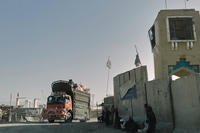Marines, like service members in every branch, typically face moves to new duty stations every few years. But the service now wants to offer more opportunities to homestead -- a chance to change assignments but skip the move.
The Marine Corps said Monday it plans to offer homesteading more often as part of its new talent management system. As the service revamps the way it recruits and retains personnel, leaders are hoping to better match Marines to specialties. Part of that is allowing them to stay put in one area of the country.
"Now we don't move Marines just because you've been in one location," Brig. Gen. Michael Borgschulte told reporters at Marine Corps Base Quantico, Virginia.
"We have tried to do that but ... with talent management that has made a much more forceful exclamation point on that," he noted.
Marine Corps spokesman Maj. Jordan Cochran added that homesteading, available to both officers and enlisted, is no longer "a negative practice to avoid."
Read Next: Soldiers Who Refuse Vaccination Can Still Serve, But Their Careers Are Over
Part of what enables the shift in policy, say officers at Quantico, is the Marine Corps' ever-growing efforts to harness data on every service member.
Lt. Gen. David Ottignon, the deputy commandant for manpower and reserve affairs, said the service ultimately hopes to use its data systems to allow officers better insight and control over their careers and give the Corps a way to predict career success and manage promotions.
"If I give you options to look at, you have a choice," Ottignon said. "I think that's what I would have liked to have had as a young officer."
Amid the changes that regular Marines can expect, Ottignon said that his team is considering a "cultural shift" that would give officers the ability to opt for a command track or staff track.
"That is completely different from what we have done for decades in the Marine Corps, which said, in order for you to be a successful staff officer, you needed to be a commander," he explained.
Ottignon described a system that would show officers a career path complete with "what you can expect and where you can expect it" that is "based on your performance, and your propensity for future service."
On the boot camp side of things, the service plans to roll out a new job matching system -- Marine Corps Occupational Specialty Matching, or MCOSM -- that it hopes will not only better match Marines to jobs but also help retain more troops past their first tour.
"If you're happier in your assignment ... something you're actually best suited for and would be happier doing, that's going to help our retention efforts," Maj. Gen. Jason Bohm told reporters at Quantico.
All of these changes come as part of the Corps' new Talent Management Plan -- a radical effort to reshape the Marines into a more mature and experienced force that is less focused on an "industrial age manpower model," according to the service.
Marine Corps Commandant Gen. David Berger unveiled the plan in early November, but leaders say some changes unveiled now pre-date the document's release and have been in the works for several years.
-- Konstantin Toropin can be reached at konstantin.toropin@military.com. Follow him on Twitter @ktoropin.
Related: The Corps' New Plan Aims to Treat Marines 'Like Human Beings Instead of Inventory'













